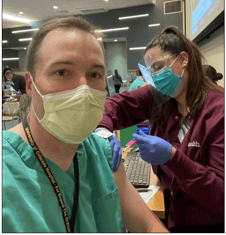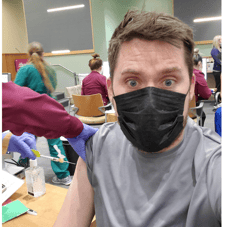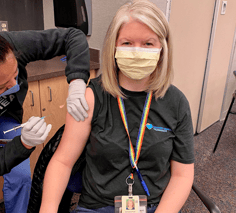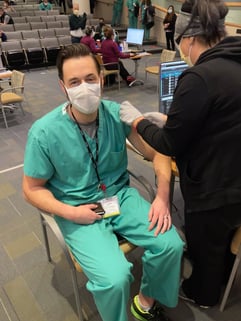Professor Ty Kiser, PharmD, recalls getting the push notification from UCHealth University of Colorado Hospital that announced he was on the list to receive one of the first COVID-19 vaccines in the state of Colorado.
“I was pretty excited. I took the first appointment I could get . . . It was like Christmas came early,” Kiser said.
Dr. Ty Kiser receives one of the first
COVID-19 vaccines.
Dr. Kiser is a clinical pharmacy professor at the Skaggs School of Pharmacy and Pharmaceutical Sciences at the University of Colorado Anschutz Medical Campus. He is also a critical care pharmacist in the intensive care unit at UCHealth, where, for the last 10 months, he has been treating some of the most severe cases of COVID-19. Kiser, as much as anyone, is amazed at the speed with which the vaccine has been developed.
“Six to eight months ago we didn’t think it was going to happen this fast,” Kiser said.
Lessons from the past months
For him, and his colleagues, the vaccine couldn’t come soon enough. As a critical care pharmacist, it’s Kiser’s job to make sure that the right medications get to the patient at the right time and in the correct dosage. But during the early days of the pandemic, drugs were in short supply and pharmacists had to make real-time, critical decisions on what the best medication choices would be.
“The first wave was scary. We didn’t have the right drugs. We didn’t know what was the right pharmacotherapy. So, I, as a critical care pharmacist, working with our infectious disease pharmacist and our critical care physicians, nurses and respiratory therapists, we were taking the data as it came to us and trying to come up with the best treatment approaches,” Kiser recalls. “A lot of these medications have toxicities . . . that can cause cardiac arrhythmias or other serious side effects.”
Dr. Scott Mueller feigns surprise as he
receives the COVID-19 vaccine at
UCHealth University of Colorado
Hospital.
According to Kiser, these “drug cocktails” were often used to put the patients into medically-induced comas so that the ventilator could breathe on their behalf while their COVID-ravaged lungs attempted to heal. Fast-forward to the present. In just a few short months, ICU teams at UCHealth and across the nation have employed nimble data crunching and innovative approaches to dramatically improve the care of COVID-19 patients.
“We’re way more prepared. We have newer, better therapies . . . We’ve got new techniques that help people oxygenate better and we can keep people off the ventilator, keep people off life support, and keep people from needing to go in a medically-induced coma and decondition in a bed for weeks at a time.”
From the hospital to the classroom
As a pharmacy professor, Kiser has been able to take these new discoveries directly from the hospital to the classroom.
“We’ve already incorporated Covid-19 into our curriculum,” Kiser said. “For example, everyone thought the critical care part was going to be the key . . . Now we’ve seen that the outpatient piece is probably the biggest and most important piece from a pharmacy standpoint.”
Pharmacists ramp up for vaccinations
Part of that outpatient care involves the pivotal role that pharmacists are playing in making sure that the COVID vaccine gets to everyone that needs it; a role that relies upon the pharmacist’s medication expertise.
Dr. Sarah Anderson, an ambulatory
care clinical pharmacy specialist at
Denver Health, rolls up her sleeve
for the vaccine.
“Each vaccine is like gold. It’s so valuable and has to be handled with care,” explains Kiser. “You have to take the vaccine out of a -80 freezer and reconstitute it before delivering to the clinics. There’s no room for error.”
In addition to the unique medical expertise possessed by pharmacists, the availability and proximity of community pharmacies has them poised to play a key role in making sure that all Americans have vaccination access, especially those in rural areas.
“Pharmacies have always played a huge role recently in vaccinations because patients can get to the pharmacy, talk to a pharmacist and get care without having appointments or a certain type of insurance. Pharmacists are the most readily available healthcare provider in the community, and they’re also one of the most trusted,” Kiser says. “In particular, this is going to be an importance piece in rural areas where access to medical facilities is sparse. Local pharmacists will be able to counsel patients, answer questions, and ultimately administer the vaccine. I think the patients are going to come to the pharmacists with lots of questions.”
Instilling confidence in the vaccine
Some of those questions already being posed to healthcare professionals center on the safety and efficacy of the COVID-19 vaccine.
According to Kiser, the vaccine has been studied in over 60,000 people. It is between 94-95% effective at preventing severe disease. And, just for good measure, he emphasizes there is no conspiracy nor microchip associated with the vaccine. So exactly what is in the vaccine?
Dr. Scott Mueller, also a critical care
pharmacist at UCHealth, gets his turn
in the vaccine chair.
Unlike traditional vaccines which work by injecting a small amount of the inactive virus into the body, the COVID-19 vaccines work using something called messenger RNA or mRNA. Once injected, the mRNA uses its “messaging” properties and tells the body to make a spiked protein that is specific to the coronavirus. The spiked protein then acts as an antigen which triggers an immune response and the creation of antibodies.
According to Kiser, much of what he and his colleagues will be responsible for moving forward is educating the public, especially marginalized communities, on the importance of getting vaccinated.
“We know that there’s an underserved portion of our population that has been hit harder – minorities are at high risk and there is skepticism there. Pharmacies will play a critical role in convincing them to get the vaccine,” Kiser expects. “The FDA, the CDC, the public health departments and the hospital organizations have all entrusted pharmacists to take this role. I’m proud to see pharmacy step up and take the lead."
Watch more here:






